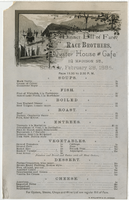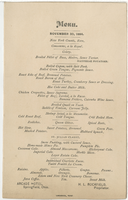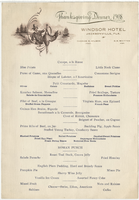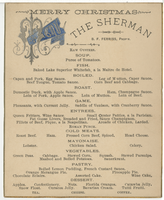Search the Special Collections and Archives Portal
Search Results

Race Brothers Oyster House and Cafe dinner menu, Saturday, February 28, 1885
Date
Archival Collection
Description
Text

Arcade Hotel menu, November 30, 1884
Date
Archival Collection
Description
Text

Thanksgiving dinner menu, Windsor Hotel, 1908
Date
Archival Collection
Description
Text

Christmas menu, The Sherman
Date
Archival Collection
Description
Text
Ruthe Deskin Papers
Identifier
Abstract
The Ruthe Deskin Papers (1933-2004) document Deskin's career as a journalist and community activist in Nevada. The papers include Deskin's "Back and Forth" columns, newspaper articles about Deskin, awards and certificates, legal documents, correspondence, photographs, obituaries and memorials, convention programs from the Nevada Press Association, and biographical ephemera. The collection also contains certificates recognizing Deskin's work with Nevada youth from Greenspun Junior High School and Ruthe Deskin Elementary School, as well as the Boy Scouts of America and the Clark County Juvenile Court.
Archival Collection
Mildred Mann Papers
Identifier
Abstract
The Mildred Mann Papers (1915-1995) contain documents related to her involvement in teaching ceramics and her work with the Independent Order of Odd Fellows. Included are correspondence, newspaper clippings, magazines, certificates, childhood school materials, manuals, photographs, a scrapbook, and newsletters. There are also Clark County Community College (CCCC) class schedules, real estate papers, and membership lists.
Archival Collection
Alex Shoofey Papers
Identifier
Abstract
The Alex Shoofey Papers are comprised of records spanning 1967 to 1972 that primarily pertain to financial operations and policies for the International Hotel and Casino-Las Vegas Hilton and the Flamingo Hotel in Las Vegas, Nevada. The collection includes daily profit and loss reports, interdepartmental correspondence, staffing and operational policies and procedures, production reports, and Shoofey's personal correspondence. Collection materials are representative of business and financial records from Shoofey's tenure as president of both the International and Flamingo hotels and casinos.
Archival Collection
Gilbert Schwartz Papers
Identifier
Abstract
The collection documents Gilbert Shwartz's early involvement with the Clark County Sheriff's Mounted Posse and the Elks Club in the early 1960s as well as the growth of his real estate company, Sahara Realty, from 1963 to 2008. The collection includes photographs and programs of the Clark County Sheriff's Mounted Posse Rodeo and programs for the Elks Club Helldorado Days Rodeo from the early 1960s. The collection also includes photographs of Schwartz and his home, slides of Sahara Realty/Realtors advertising around Las Vegas, and autographed team photographs of the Central Little League teams sponsored by Sahara Realty. Also included is a program for the National Association of Real Estate Brokers annual conference held in Las Vegas in 1974.
Archival Collection
Julian Taber Collection on Gambling Addiction
Identifier
Abstract
The Julian Taber Collection on Gambling Addiction (1977-1988) includes papers, proposals, internal reports, memoranda, and newspaper articles chronicling the work of Julian Taber, an early specialist in the field of gambling addiction. The majority of the collection relates to Taber’s work and pilot programs at the Brecksville Veterans Administration (VA) Hospital in Brecksville, Ohio, with select materials pertaining to an alcohol dependency treatment program he coordinated at the VA hospital in Reno, Nevada.
Archival Collection
Underground House of Las Vegas Collection
Identifier
Abstract
The Underground House of Las Vegas Collection (1964-2004) consists of newspaper clippings, magazine articles, books, photographic prints, and digital images detailing the construction and history of Girard "Jerry" B. Henderson’s "Underground House," a Las Vegas underground dwelling completed in 1978.
Archival Collection
